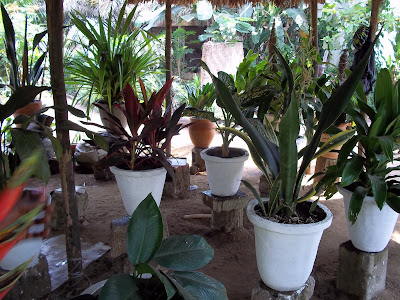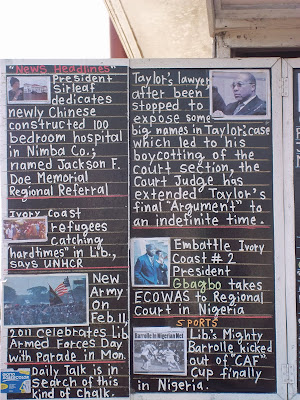 I was walking down Tubman Blvd in Sinkor and ran across the most beautiful flower garden. I had to stop and take pictures. If you live in Atlanta, a flower garden in Sinkor is like a park by Lenox Mall. Sure, you can put one there, but it would be an out of place delight.
I was walking down Tubman Blvd in Sinkor and ran across the most beautiful flower garden. I had to stop and take pictures. If you live in Atlanta, a flower garden in Sinkor is like a park by Lenox Mall. Sure, you can put one there, but it would be an out of place delight.

 This is Ben of the Coop-Ben Flower Garden. Cooper is his brother. Ben is most proud of the orchids they grow. He explained that 20 different species of orchids grow in Liberia. Ben was excited to show off all he knew about the nursery. Unfortunately there weren't any roses for Valentine's Day, but he makes friends in hopes that they will bring him seeds he can cultivate. In the above photo, Ben is in front of the palava hut. A palava hut is defined as a meeting place where people discuss and resolve issues out of the court system. It is a place where people can talk all the news, and more loosely gossip. Palava = informative talk in simple terms.
This is Ben of the Coop-Ben Flower Garden. Cooper is his brother. Ben is most proud of the orchids they grow. He explained that 20 different species of orchids grow in Liberia. Ben was excited to show off all he knew about the nursery. Unfortunately there weren't any roses for Valentine's Day, but he makes friends in hopes that they will bring him seeds he can cultivate. In the above photo, Ben is in front of the palava hut. A palava hut is defined as a meeting place where people discuss and resolve issues out of the court system. It is a place where people can talk all the news, and more loosely gossip. Palava = informative talk in simple terms.


 This is ben and his passion flower, he says.
This is ben and his passion flower, he says.
Please don't tell Desmond that I posted a picture of him pumping water from a well, but I wanted you to see how people get fresh water if they don't have indoor plumbing. I still don't advise you to drink it, or even use it to brush your teeth initially, but for bathing and washing clothes, you have to pump from the community well. Often times, you can see a lot of children pumping the water in pails to take home. This is a reality for most Liberians, but also many people around the world. Now I'm very uppity and have pumped water for the arm workout it provides once or twice, but fortunately water runs in my house in the daytime, and the houseboy brings the well water before he goes to school in case I need it. *Remember the term houseboy from last week.

Being the media enthusiast that I am, I found this news board across from Coop-Ben's Flower Garden in Sinkor. Whoever is in charge of updating it does so everyday, and the people read it as they pass by. The news on this chalkboard is less sensational than the newspaper, and people are eager to get the headlines for free with this method.

You will see the phrase "catching hard times" on this post. That is a common Liberian phrase that means exactly as it says. Add it to your Liberian dictionary and use accordingly. Can't pay bills this month? Tell your landlord you're "catching hard times." School got you down? Yes, you are also "catching hard times."

On a more serious note:
The hardest part about being in Liberia is seeing the foreign influence that isn't exactly foreign aid. It seems like the best get-rich-quick scheme of this day and country is to start a non profit, non governmental organization with great proposals and would-be plans for a better Liberia. All I know is that peace and rebuilding is turning into a profitable industry in a country where a little money could go very far.
I first visited the CARE Office in Liberia to see what they were up to. I was optimistic because this NGO is headquartered in Atlanta and the CEO recently received an award from Georgia Tech for her international work, etc. Basically my findings for CARE Liberia are as follows:
I spoke with one man about the ongoing projects in Liberia. He said there is an ongoing project on water and sanitation that gains a lot of funding from the Howard Buffet Foundation. Most of CARE Liberia's other projects are centered around food and income security, gaining funding from the European Union. The representative also said that they try to solicit funds from USAID, but currently that money is still pending approval. This representative was educated in the Ivory Coast, which I was delighted to discover and asked about the efforts for Ivory Coast refugees. He said CARE has a global emergency coordination team, and they are currently in Nimba County, Liberia where they have reached 20-30 000 refugees at last count, and are distributing non food items like tents, blankets and buckets.
My fair assessment of our conversation is that nothing is really going on in Liberia, through this office at least. Understand that "ongoing project" means "whenever we feel like working on it" in Liberia, so there isn't much water being purified. The representative couldn't tell me exactly what they were working on at the present time. There was a lot of explanation of what they do at CARE, and less of what gets done in Liberia, if you understand what I'm saying.
Take for example the Ivorian refugees. There is a French speaking, Ivorian educated man right in Monrovia doing nothing at CARE, and he's not in Nimba County trying to assist with aid. He doesn't even know how many people they are helping. 10 000 is a large window of error in a country that should house first responders to crisis in the Ivory Coast. How many blankets do they have to hand out? Have they run out yet? These are more accurate ways to keep count of the activity. Truly, the emergency team is probably distributing materials to Liberians who want tents because they can't tell the difference between who has fled here with nothing from the Ivory Coast and who is a Liberian citizen in poverty. Many of the tribes are the same between the two countries, so a foreign responder probably cannot distinguish one African from the rest.
Disappointed, I visited the Carter Center in Mamba Point to find the same "whole lotta nothing" being done. The documents they gave me on the Liberian programs were outdated, and no one could tell me exactly what they do to help Liberians from day to day. I don't want to be unfair and say the Carter Center is an idle space as well, as they gave me the information for their project coordinator in hopes that I can really chat with him and maybe even go out on a task. As for now, I'm just unimpressed. I am writing a more in depth assessment of these findings, so let me know if you're interested in reading them. Even the UN, I'm convinced, is somewhat a scam, and I am by no means an extremist. I would just like to see Liberia become rich again, rather than people becoming rich off our need.
As I left the Carter Center, we drove along the most beautiful part of Mamba Point. The beach and water was perfect for a resort vacation. It was just covered in sewage. The smell of trash just hit you and blew with the ocean breeze. Then I saw a little girl drinking from a cup beside her mud home, and I didn't even want to think of where her drinking water came from. As we came back inland my uncle pointed at a gutted, looted, shell of a once beautiful home and said "there's your Godma Cheryl's house." I can picture her playing in that ocean when she was little... before it was a sewer. How unfortunate. All the things Liberians can have, stripped from war and sunk in poverty.
If NGO's spent less money on administrative costs and salaries, they could really fix that beautiful beach I saw today. I don't like to post ugly pictures of Liberia, so I didn't take any. A beach should never be a landfill and a non profit organization should be beneficial to our community. Alas, what should be and what is are two different things.
My next post will be fun, I promise. Four weeks back home has brought real life to the forefront.


This here is an engaging piece. You've carefully peeled and revealed what has been the truth for quite some time. To have it laid out as elegantly as this makes it easier for us to implement powerful solutions to our problems at home. Between the Garden the News and your piece, hopes blossoms. We can embrace those to set the precedence for good things to follow. Bravo!
ReplyDeleteI have noticed the flower place in Sinkor every time we drive by there because it is so lush (in Liberia, The Land of Lush, it takes a LOT of gorgeous greenery to be noticed!). Now that I have read your blog post I feel like I know Ben and Cooper. Will definitely bring them seeds next trip!
ReplyDeleteYes Ms. Beth! Ben wants to grow his business and open a greenhouse for people to do plant research!
ReplyDeleteThank you Joe for that as well!
ReplyDelete